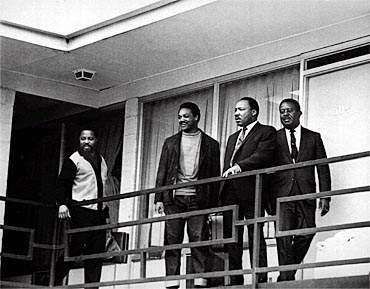|
||||||||
|
||||||||
|
 Martin Luther King Jr. is seen on the balcony of the Lorraine Motel in Memphis, Tenn., on April 3, 1968, the day before he was assassinated there. James Earl Ray, the petty criminal who confessed to assassinating King, then recanted and spent decades seeking a trial, died Thursday. Pictured from left are, Hosea Williams, Jesse Jackson, King, and Ralph Abernathy. |
 OUTSIDE ROOM 307 -- Moments later on April 3, Rev. Ralph Abernathy led Dr. Martin Luther King Jr., Rev. James M. Lawson Jr. and others into room 307 at the Lorraine Motel to discuss the restraining order and plans for the second march. King, who was staying in room 306, had met with young people and other groups of strike supporters who wished to be part of future protests. |
|||||||
|
 Dr. Martin Luther King Jr. and one of his aides, Jesse Jackson, at Mason Temple in Memphis on April 3, 1968. On that stormy night, Dr. King delivered his last public address, which became known as the "Mountaintop Speech," to an audience of more than 2,000. |
 MOUNTAINTOP SPEECH -- On the stormy night of April 3, 1968, Dr. Martin Luther King Jr. delivered his last public speech. Rev. Ralph Abernathy (right) applauded as King told an audience of more than 2,000 at Mason Temple in Memphis that the April 8 march must be held to refocus attention on the sanitation strike. He said Memphis had "refused to be honest with its public servants who happen to be garbage men." The speech has become known as the "Mountaintop" speech. "Like anybody, I would like to live a long life. Longevity has its place. But I'm not concerned about that now. I just want to do God's will. And He's allowed me to go up to the mountain, and I've looked over, and I've seen the Promised Land. I may not get there with you. But I want you to know tonight that we, as a people, will get to the promised land." |
|||||||
|
||||||||
|
||||||||
|
||||||||
|
||||||||
|
 LORRAINE BALCONY -- An assassin's bullet found Dr. Martin Luther King Jr. on the balcony of the Lorraine Motel in Memphis at 6:01 p.m. April 4, 1968, dropping him to the concrete near his second floor room. Aides and others rushed to his side, then pointed in the direction from which the shot came. Kneeling at King's side is Marrell McCollough, an undercover Memphis police officer. Others on the balcony included Andrew Young (left) and Mary Hunt (right), a teenage clerical assistant. King was hit on the right side of his face, near the jaw; he died in the emergency room of St. Joseph Hospital at 7:05 p.m. |
 JACKSON AT THE LORRAINE -- In the courtyard of the Lorraine Motel after Dr. Martin Luther King Jr. was shot and fatally wounded April 4, 1968, Rev. Jesse Jackson, a King aide, talked with Shelby County Sheriff William N. Morris Jr. (left) and Claude Armour, former Memphis fire and police commissioner who served as law enforcement special assistant to Tennessee Gov. Buford Ellington. "The bullet exploded in his face...It was similar to the Kennedy incident. The police were all around, but there is no military protection against an ambush and he was ambushed," said Jackson. |
|||||||
|

 |
||||||||



